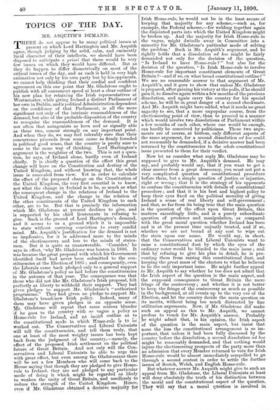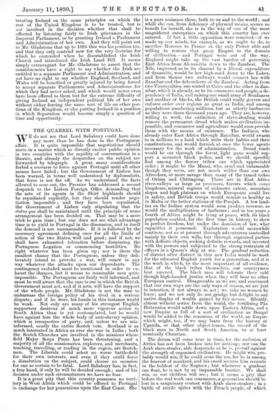TOPICS OF THE DAY.
MR. ASQUITH'S DEMAND. THERE do not appear to be many political issues at present on which Lord Hartington and Mr. Asquith agree, though judging by the solid, calm, and eminently lucid character of their intellects, we should have been disposed to anticipate a priori that there would be very few issues on which they would have differed. But as they do happen to differ diametrically on most of the critical issues of the day, and as each is held in very high estimation not only by his own party but by his opponents, we cannot help thinking that their cordial and confident agreement on this one point that Mr. Gladstone ought to publish with all convenient speed at least a clear outline of his new plan for retaining the Irish representatives at Westminster, while giving Ireland a distinct Parliament of her own in Dublin, and'a political Administration dependent on the confidence of that Parliament, is all the more significant not only of the intrinsic reasonableness of the demand, but also of the probable disposition of the country to recognise the reasonableness of the demand. It is not often that antagonists as keen and as signally able as these two, concur strongly on any important point. And when they do, we may feel tolerably sure that their concurrence proceeds from some cause so firmly founded in political good sense, that the country is pretty sure to come to the same way of thinking. Lord Hartington's argument is the weightier of the two. This is not a ques- tion, he says, of Ireland alone, hardly even of Ireland chiefly. It is chiefly a question of the effect this great change will have on the Constitution and destiny of the United Kingdom, and without knowing that, the whole issue is concealed from view. Yet in order to calculate the effect of the proposed change on the Constitution of the United Kingdom, the very first essential is to know, not what the change in Ireland is to be, so much as what the consequent change in the relations of Ireland to the United Kingdom, and the change in the relation of the other constituents of the United Kingdom to each other, are to be. But that is precisely the information which Mr. Gladstone at present declines to give, and is supported by his chief lieutenants in refusing to give. Such is the ground of Lord Hartington's demand, and it seems to us a ground which it is impossible to state without carrying conviction to every candid mind. Mr. Asquith's justification for the demand is not so impfessive, for it is addressed more to the minds of the electioneerers and less to the minds of states- men. But it is quite as unanswerable. Consider,' he says in effect, 'why Mr. Gladstone was beaten in 1886. It was because the great proposal with which his Government identified itself had never been submitted to the con- stituencies at the Election of 1885 ; and consequently, even the Liberals came back pledged only to a general support of Mr. Gladstone's policy as laid before the constituencies in the autumn of that year. The consequence was that those who did not like Mr. Gladstone's Irish proposal, felt perfectly at liberty to withhold their support. They had given pledges to support Mr. Gladstone's " authorised programme." They had given no pledge to support Mr. Gladstone's brand-new Irish policy. Indeed, many of them may have given pledges in an opposite sense. Mr. Gladstone will repeat that same serious blunder if he goes to the c,o,untry with so vague a policy as Home-rule for Ireland, and no outline as to the constitutional mode in which Herne-rule is to worked out. The Conservatives and Liberal Unionists will tell the constituencies, and tell them truly, that one at least of the most weighty issues has been kept back from the judgment of the country,—namely, the effect of the proposed Irish settlement on the political future of Great Britain. And not only will the Con- servatives and Liberal Unionists be able to urge this with great effect, but even among the Gladstonians there will be not a, few Members who will come back to the House saying that though they are pledged to give Home- rule to Ireland, they are not pledged to any particular mode of doing it which might be regarded as likely to weaken the unity of Great Britain, and neeclimly to reduce the strength of the United Kingdom. gonce, even if Mr. Gladstone obtained a decisive majgrity for Irish Home-rule, he would not be in the least secure of keeping that majority for any scheme,—such as, for example, the Federal scheme,—for welding together again the disjointed parts into which the United Kingdom might be broken up. And the majority for Irish Home-rule in the vague, might dwindle away in Committee into a minority for Mr. Gladstone's particular mode of solving the problem.' Such is Mr. Asquith's argument, and he rightly holds that a dissolution ad hoc might be fairly demanded not only for the decision of the question, " Is Ireland to have Home-rule " but also for the decision of the question, " Is Irish Home-rule to involve Home-rule for important constituent elements of Great Britain ?—and if so, on what broad constitutional outline ?" We see no reasonable answer to that argument of Mr. Asquith's, and it goes to show that unless Mr. Gladstone is prepared, after gaining his victory at the polls, if he should gain it, to dissolve again within a few months of the previous dissolution, and again carry the country for his special scheme, he will be in great danger of a second checkmate. And Mr. Asquith might have added, what it needs no great sagacity to see, that a more unpopular course, from the electioneering point of view, than to proceed in a manner which would involve two dissolutions of Parliament within a few months of each other, where one would be enough, can hardly be conceived by politicians. These two argu- ments are of course, at bottom, only different aspects of the same argument, for a second dissolution ad hoc could not reasonably be demanded, if a decisive answer had been returned by the constituencies to the whole constitutional issue presented to them for their verdict.
Now let us consider what reply Mr. Gladstone may be supposed to give to Mr. Asquith's demand. He may say, and probably would say, that if you want to get a. clear answer from a great democracy, you must not put a. very complicated question of constitutional procedure before them, but a simple question of justice or injustice, right or wrong ; that it is the strategy of his opponents to confuse the constituencies with details of constitutional procedure ; and that it is his best and highest policy to- keep their eyes fixed on the political morality of giving Ireland a sense of real liberty and self-government ; and that, so far from its being true that the main question is the question of the effect upon Great Britain, this matters exceedingly little, and is a purely subordinate question of prudence and manipulation, as compared- with the great moral question whether Ireland has been and is at the present time unjustly treated, and if so,. whether we are not bound at any cost to wipe out the stain upon our name. He would say, in short, that the Conservatives and Liberal Unionists want to raise a constitutional dust by which the eyes of the ordinary voter would be blinded to the main issue ; and that by refusing to give his plan in detail, he is pre- venting them from raising this constitutional dust, and keeping the great mass of the electors to what he believes to be the only important issue. He might further appeal. to Mr. Asquith to say whether he too does not admit that the Irish aspect of the question is the main aspect, and the supposed consequence to Great Britain the mere fringe of the controversy ; and whether it is not better to keep the fringe of the controversy as much as possible in the background, at all events up to the very eve of the Election, and let the country decide the main question on its merits, without being too much distracted by fine utilitarian arguments. Now, if Mr. Gladstone did make such an appeal as this to Mr. Asquith, we cannot. profess to vouch for Mr. Asquith's answer. Probably ye might admit that, in his opinion, the Irish aspect- of the question is the main aspect, but insist that none the less the constitutional arrangement is so im- portant, that unless it had been fully discussed by the country before the dissolution, a second dissolution ad hoc might be reasonably demanded, and that nothing would injure the electioneering prospects of the party more than an admission that every Member returned to vote for Irish Home-rule would be almost immediately compelled to go. through a second contest in order to settle the further issues of Scotch, Welsh, and English Home-rule. But whatever answer Mr. Asquith might give to such an appeal from Mr. Gladstone, the Liberal Unionists at least will deny absolutely the truth of his distinction between the moral and the constitutional aspect of the question. They will say that a moral question is involved is treating Ireland on the same principles on which the rest of the United Kingdom is to be treated, but is not involved. in the decision whether that shall be effected by listening fairly to Irish grievances in the Imperial Parliament, or by granting Ireland a Parliament and Administration of her own. And they will point out to Mr. Gladstone that up to 1885 this was his position too, and that they only contend now for the very doctrine for which he contended when he disestablished the Irish Church and introduced the Irish Land Bill. It seems simply extravagant for Mr. Gladstone to assert that the constituencies have a right to say whether the Irish are entitled to a separate Parliament and Administration, and yet have no right to say whether England, Scotland, and Wales will be benefited or greatly injured by being forced to accept separate Parliaments and Administrations for which they had never asked, and which would never even have been offered to them but for the extreme difficulty of giving Ireland an independent political life of her own without either forcing the same sort of life on other por- tions of the Kingdom, or else putting Ireland in a position in which Separation would. become simply a question of time and opportunity.







































 Previous page
Previous page